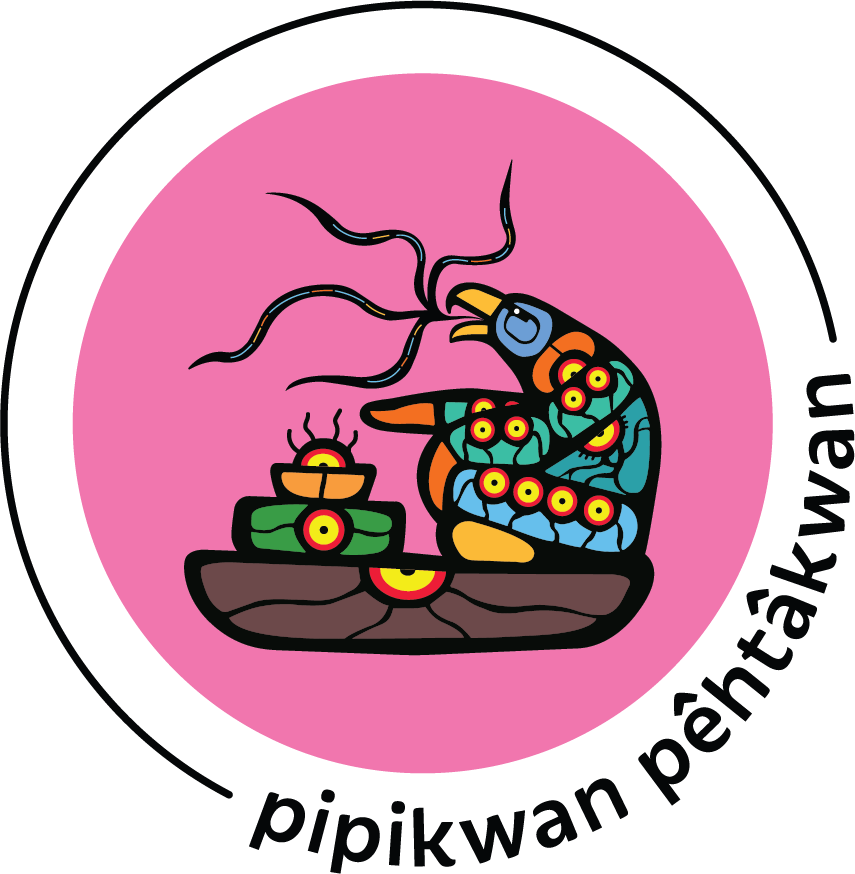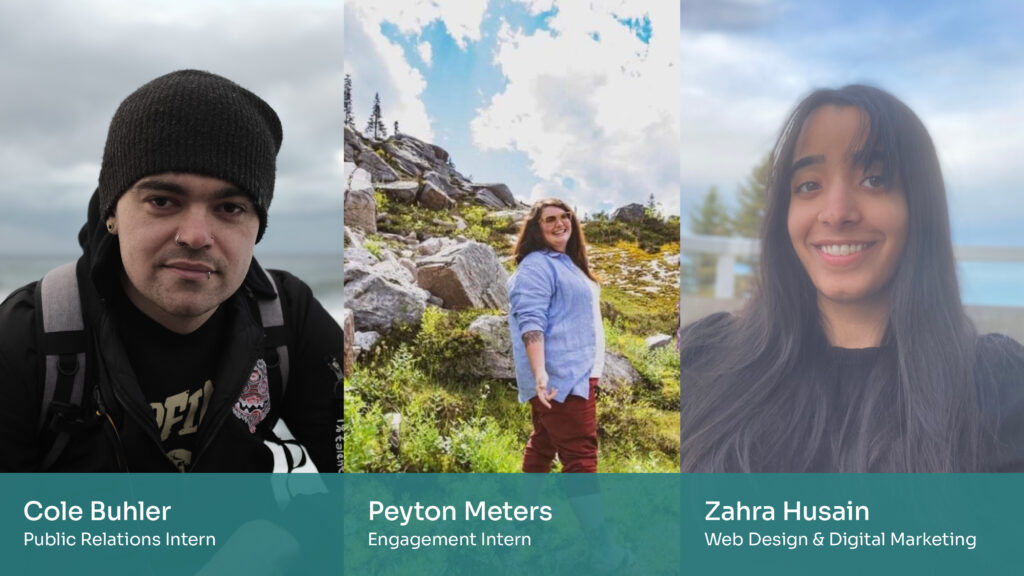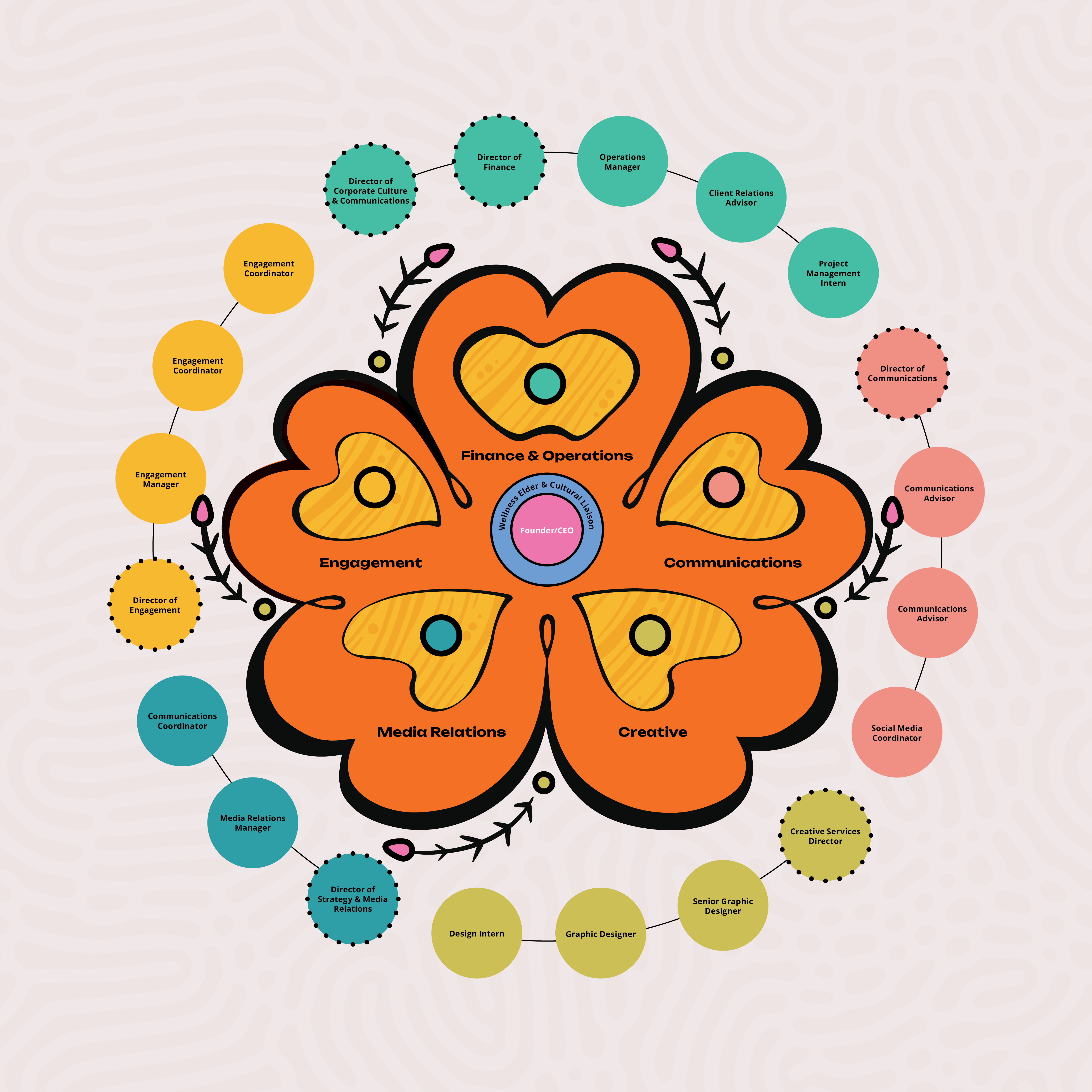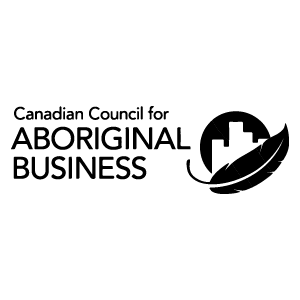Interns are great for bringing new ideas to any team and help to increase productivity. We are privileged to have three talented interns supporting us this summer.
Meet Peyton Meters, Cole Buhler and Zahra Husain.
Q: Tell me about yourself?
A: I’m Peyton Meters. I’m Mi’kmaq from the east coast and I currently live on Treaty 8 Territory in High Prairie, Alberta. I consider myself an artist and love spending time in my art studio creating. Most of my work uses mixed medium but I am always inspired by the natural world and bring my relationships with the natural world into my contemporary work.
Q: Which school do you attend and what are you studying?
A: Other than the school of life, which has given me the most knowledge and experience, I started my social work education at MacEwan University. I never felt that the content was right for me to build a holistic practice I really desired. Instead of completing my degree there, I actually switched to the Yellowhead Tribal College and I’m completing an Indigenous Bachelor of Social Work.
Q: What’s your work experience and volunteering experience?
A: The most influential person I ever met was a youth counsellor when I was about 13 or 14 years old. When I met him, he was a Child and Youth Counsellor, but before that he worked as a police officer, firefighter, and then lawyer. Those are all really big careers that require you to invest a lot of time into building! He told me, you never have to stick to one thing and you can keep following your spark. A lot of people told me that we decide what we want to be and then stick to that. There is a value in society for tenure and seniority over experiences. He taught me that I can try anything I want so that I have a chance to really find my gifts.
So my experience has been really vast too – I built houses for a number of years, I worked in interior design for a few years, I spent some time in a medical office, I took graphic design and worked in communications for three years, and then I worked as a research assistant for two years. Over the last six years I worked specifically in advocacy and governance, and I currently teach mental health at NorQuest College. I just keep following my spark, which has brought me to pipikwan pêhtâkwan!
I have the same sort of experience in volunteering. I built a calendar and helped with fundraising for a group called ACTSS (Animal Cancer Therapy Subsidization Society), I volunteered for Pride Tape and Free Footie/Free Hockey Edmonton coaching a team of kids from Ekota School in road hockey. My most rewarding experience was as a mentor for Big Brothers Big Sisters of Edmonton when I was a mentor for a 9-year-old girl. We worked together until she was 13 and I was so honoured to be able to spend time with her and contribute to her life for that time.
Q: How did you hear about pipikwan pehtakwan? What was appealing about the organization?
A: The whole reason I wanted to enter the Indigenous Bachelor of Social Work program was to decolonize my practice and my life. I left my full-time job in February 2022 after being there for 10 years. I wasn’t really thinking about working for a while and wanted to focus on my schooling, but I learned about pipikwan pêhtâkwan and the work that everyone was doing there.
I knew pipikwan pehtakwan aligned with my values as a person and a social worker. The role itself gave me opportunities to build more capacity to approach projects in a decolonized way. Honestly, pipikwan pêhtâkwan is the type of company that will do things differently. And that difference is what was missing in all of my previous experiences.
Q: What kind of skills are you bringing to pipikwan pêhtâkwan?
A: I think I have learned just as much as I have brought. I really enjoy that the leaders who I have worked with have provided space for me to use skills I gained in the past, like graphic design and communications, or some of my research and facilitation experience. In my role as Engagement Intern, we really get to use a lot of social work skills in building relationships and outreach. Even having a varied skill set, I have really learned how to re-use those skills in a new way. My facilitation skills and approaches have changed, my research methodology has been re-framed, and even my idea of relationships have been transformed.
Q: What are some projects you’ve worked on?
A: I have been exposed to a number of projects in my time here. I have conducted focus groups and interviews, developed training materials for clients, wrote proposals and I’m working on strategic planning sessions.
The thing I like about pipikwan pêhtâkwan is that the clients come with a variety of needs and we have such a talented team that works in a truly collaborative way. All the skills get brought together to elevate the deliverables for clients. I have been really lucky to get involved in different projects and contribute in different ways.
Q: What kind of growth have you experienced since working at pipikwan pêhtâkwan?
A: Everything I learned previously, I have been able to re-learn or expand on. The opportunities for growth in the intern role are endless. Everyone is so willing to let you explore your gifts and contribute in different ways. From a personal perspective, I have learned a lot about myself and some of the values I hold. For example, most organizations will say they care about work-life balance, but pipikwan pêhtâkwan puts that value at the forefront. I have been so lucky to build relationships with others on the team, been given guidance and skills on balancing work to ensure I have time for my family, ceremony, and
community.
Q: What is one of your proudest professional accomplishments so far?
A: For people reading this I don’t think my answer for this one is going to be good so maybe you should skip this one lol.
My proudest moment is actually a mistake. Mistakes sometimes cause a lot of fear and anxiety; for me especially because I’m quite sensitive. Sometimes when things don’t go as expected and we are new, we worry that people will lose trust in our capabilities. When I made the mistake, the team was right there to help reassure me, problem solve solutions, and empower me to try again with new information. It was really the collaboration that happened which made me really proud to be in the role and learning with people who hold themselves to a high standard and who embody the values they say they hold.
Q: Are there other areas you are hoping to work on in the future?
A: I am really enjoying the work on blending communications and engagement. Developing content for teaching/training has been really rewarding. I have learned a lot about developing content based on the client/organization’s needs. I am hoping to spend more time helping people advance themselves and others through education.
I haven’t spent a lot of time working on consultation and focus groups that require a trauma-informed lens yet. As an emerging social worker, that is something that I would really be interested in setting as my goal for the next year.
Q: What are your goals after school?
A: More school, more life! I want to keep learning as much as I can in the time I am physically in this world. My current plan is to complete my master’s degree in clinical social work and bring Indigenous healing practices to my professional scope.
I am working on a practicum proposal for next year to finish my degree with an International Practicum in Peru, helping Indigenous communities on the outskirts of Arequipa. But with all honesty, I don’t know what my goal will be because I am really letting myself be guided and I am really comfortable changing my goals if an opportunity or experience crosses my path that I feel aligns with my values. Let’s just say I have a strong foundation, but an open mind!
Q: Do you have any other areas you’re hoping to work/gain experience in outside of being the Engagement Intern?
A: Personally,. outside of engagement, I’m really interested in art therapy. I am hoping to bring together practices like the Family Constellation Therapy and art. Family Constellation Therapy is a therapy approach based on family values of the Zulu People of South Africa and grounded in metaphysical relationships to help in healing. Indigenous art also supports healing though metaphysical relationships and learning, such as with storytelling, drumming, dancing, and painting. I would really like to work on developing a helping practice that holds space for healing at the centre of everything.
At pipikwan, outside of engagement, I would really like to explore project development and management. I went to NAIT for project management, but I have limited exposure to managing large projects after that. It would be great to see how I can use some of that knowledge and learn new ways to manage projects.
Q: Tell me about yourself?
A. My name is Cole Buhler, I’m a Public Relations Intern with pipikwan pêhtâkwan. I’m nēhiyawak (Cree) through both of my grandmothers and Irish and German through my grandfathers. I grew up in Northern Alberta in a small, French farm-town called Falher.
I consider myself a journalist by trade – I’ve been in love with journalism my whole life. Some of my favourite journalists are Joan Didion, Hunter Thompson, and Marie Colvin. Growing up, I wanted to be a war journalist – covering conflict across the globe. I didn’t go back to university until I was 27, spent 6 years getting my degree, and by the time I graduated I was married and old – so no war journalism for me, because my wife would kill me before it happened in the field.
My father instilled a love for reading in me when I was quite young. Some of my favourite authors outside of journalism are Kurt Vonnegut, Haruki Murakami, and Philip Roth. I write fiction as well – I’ve always wanted to be some sort of novelist.
I grew up wholly disconnected from my identity as an Indigenous Person. I spent a childhood hiding it, because I grew up in a self-loathing, racist environment. I don’t blame anyone for this – we find the root of this situation continually repeated within intergenerational trauma. Regardless, I’ve spent the past 5-6 years reconnecting with myself as an Indigenous Person – determining who I am and what I’ve always been.
Q: Which school did you attend and what did you study?
A: I graduated from MacEwan University with a Bachelor of Communications Studies, where I majored in journalism – in the spring of 2020. In 2019, I attended Queen Margaret University in Musselburgh, Scotland, where I was enrolled in an International Public Relations course. I’ve also lived in Nagasaki, Japan, where I studied Japanese and taught university students’ English literature and poetry at the Nagasaki University of Foreign Studies in 2018.
Q: What’s your work experience and volunteering experience?
A: I’ve written professionally for a non-profit, food-security organization called The Leftovers Foundation. I have interests in gardening, food security, and preserving our natural inner-city ecosystems to continually grow produce.
I volunteered as a student coordinator for MacEwan’s international student office, where I ran the help desk and assisted with international opportunity presentations. I worked on several presentations where I spoke with parents (one-on-one) about the benefits of international education for their child(ren).
I also worked as the social media manager for the Faculty of Fine Arts and Communications at MacEwan for two years.
Q: How did you hear about pipikwan pêhtâkwan? What was appealing about the organization?
A: I honestly can’t remember how I found the job opportunity – it may have been on the MacEwan career opportunity website. I was enamoured with the idea of the company because the opportunity had presented itself at a time when I was just beginning to reconnect with my identity and what that meant to me. I think the most appealing aspect of the organization is that it felt like it came to me at just the right time.
Q: What skills do you add to the work pipikwan pêhtâkwan does?
A: I’m a strong writer, editor, and communicator (Or, at least I hope so). I’m not sure I bring a unique perspective to the company – there are so many people we work with who are much more qualified to give this kind of answer (+ much more interesting). I just try my best and I hope that’s enough.
Q: What are some projects you’ve worked on?
A: This is all kind of recent, but I’m proud to work for Calgary Pride, Boyle Street Education Centre and many other organizations. This will be published at a later date , but my favourite (most important) project was interviewing Dr. Maria Campbell – the author of the seminal novel Halfbreed. Growing up, I dreamed of interviewing and writing about important authors, and I got to live out that dream with pipikwan pêhtâkwan.
I’ve worked with clients where the first thought in my head is – ‘I’d do this for free.’ I love what we do, but I’m only just getting started.
Q: Are there other areas you are hoping to work on in the future?
A: I’ve always considered myself as someone who’s always learning. I’d love to learn as much as possible and carry that within me and outside me for the rest of my life. But, practically, I want to work on my ability as a fiction writer.
Q: What kind of growth have you experienced since working at pipikwan pêhtâkwan?
A: I’ve grown more in the past two years than I have in the previous 20. As a writer, I want nothing more than this to be my career. As a person, which is much more important, I’ve become who I’m meant to be. Shani gave me the opportunity to pursue my dream of becoming a writer, but she gave me so much more – as a writer with purpose.
Q: What are your goals after school?
A: I’m currently living them – working with pipikwan pêhtâkwan during and after my journalism degree is a dream come true. I am looking into masters programs – I’ve already come to terms with being a forever-student. I’d like to take something out of my scope as a journalist though, and widen my skill set. I’d like to eventually get back into tutoring (taking Japanese and French lessons), and I’ve also been looking into studying Cree. I’m recently married and my wife and I are planning on travelling more (we met in Japan, while we were both studying). I’d like to do more freelancing – writing longer pieces for magazines and various publications.
Q: Do you have any other areas you’re hoping to work/gain experience in outside of Public Relations Intern?
A: I’d love to learn more about Indigenous engagement. I definitely want to stay away from building websites.
Q: Tell me about yourself?
A: Hello! I’m Zahra. I’m a third-year university student passionate about improving people’s experience through design. Previously, I was enrolled in computer science at the University of Calgary but switched to my current program as it better suits my interests.
I live in Treaty 7 territory with my family, originally from India. We have been here since 2007 and previously lived in Houston and Dubai, where I was born with my other two sisters (we are triplets).
I enjoy spending time with family and friends, going for walks, watching TV shows, and cooking in my spare time.
Q: Which school do you attend and what are you studying?
A: I attend Mount Royal University and am studying Information Design. I will be going into my third year in the fall.
Q: What’s your work experience and volunteering experience?
A: In high school, I volunteered through my school’s volunteer program as well as Youth Central. Through those programs, I’ve participated in a variety of activities including cooking meals for families facing situations of adversity and crisis, painting and packaging plant pots for senior care homes, and helping to keep a local community garden beautiful.
I haven’t been as active since starting university as I’ve been focusing on school, but occasionally I volunteer for a local community hall and help package food for families.
Q: How did you hear about pipikwan pêhtâkwan? What was appealing about the organization?
A: I first heard of pipikwan pêhtâkwan through Mount Royal University’s job bank. I was looking for places to apply and saw that pipikwan was hiring. The company’s vision, mission, and values resonated with me and I thought the work the organization was doing was inspiring and meaningful. pipikwan pêhtâkwan also stood out to me because it was one of the few companies on the job bank that was not part of the oil and gas and energy industries (sectors I am not interested in working in).
Q: What skills are you bringing to pipikwan pêhtâkwan?
A: Over the past two years that I’ve been in my program, I’ve been building my skills in problem-solving, design-thinking, research, writing, planning, data visualization, and usability testing. Along with these, other strong skills of mine would be listening, observation, respect, flexibility, and multi-tasking.
Q: What are some projects you’ve worked on?
A: A few projects include creating a website for a youth conference (which hasn’t launched yet), supporting the development of various functions for existing client websites as well as building new sites for new clients. I’m also working on helping to redesign pipikwan pêhtâkwan’s website and designing the company’s intranet. There are a few other website and graphic design projects on the horizon.
Q: What kind of growth have you experienced since working at pipikwan pêhtâkwan?
A: I’ve gained a lot of experience working with various website development software that I had limited experience using before. I’ve also noticed a slight increase in confidence as I feel more comfortable sharing my thoughts and ideas with my supervisors than when I started working here.
Through things like the Indigenous Canada course and discussions during daily check-ins I’ve also gained a deeper understanding of system challenges faced by Indigenous Peoples. It has been an eye-opening experience for me, and I’ve started having conversations with my friends and family about the importance of elevating Indigenous voices and perspectives.
Q: What is one of your proudest internship professional accomplishments/moments so far? A: One of my proudest accomplishments is working on the youth conference website. It was my first time working with a platform that was limited in its capabilities, so figuring out how to work around those limits and display the content in an engaging way was a fun challenge. I also got to apply skills that I learned in school.
Q: Are there other areas you are hoping to work on in the future?
A: Yes, in the future, I’d like to work more in the areas of marketing and social media. I’d also like to gain some experience in SEO, analytics, and graphic design.
Q: What are your goals after school?
A: I’m passionate about accessibility, so I hope to be involved in projects where I can apply universal and inclusive design principles. Also, through this internship, I have learned how much I like web design and would like to continue to do something like this or UX design once I graduate.
I have also realized that being part of an organization focused on uplifting Indigenous voices is something that I find very fulfilling and that I would like to continue to be involved in this type of work.
Ultimately, I want to be involved in meaningful projects that uplift and benefit people, especially vulnerable and marginalized groups, and make their lives easier.
Q: Do you have any other areas you’re hoping to work/gain experience in outside of being the Web Design and Digital Marketing Intern)?
A: I enjoy what I’m doing right now quite a bit, but I would also like to gain some experience in digital marketing, social media, SEO, analytics, and graphic design. I would also like to gain experience in video production and UX design.




